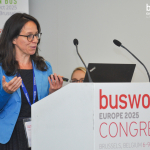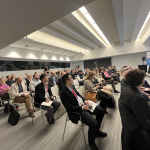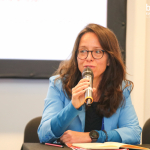From 6-9. October, the Busworld Europe 2025 Congress was held at Brussels Expo, uniting policymakers, operators, manufacturers, researchers, and civil society. As the premier event for the bus and coach sector, it focused on sustainable, inclusive, and digital public transport. EPF’s Senior Researcher Delphine Grandsart took part in three sessions, aligned with our mission to advance passenger rights, inclusion, accessibility, and improved information.
Watch the aftermovie and re-watch the conference sessions here
“Improved rights and better information for travellers” (06.10.2025, presentation available here)
During the session, EPF highlighted key gaps and improvement areas in the current Bus and Coach Passenger Rights Regulation (EU 181/2011) – see also our position paper here:
- EPF suggests lowering the current 250 km travel threshold to 50 km to extend passenger protections and make the rules more passenger-focused.
- Compensation should cover luggage loss or damage beyond accidents, requiring luggage receipts and prompt compensation for damaged mobility equipment.
- Accessibility at terminals and vehicles should be improved, inspired by UK standards, along with regular staff training to better assist passengers with reduced mobility.
- For delays over 60 minutes, passengers should have rights to re-routing, reimbursement, and assistance, including flexibility to use alternative carriers or modes.
- Compensation for delays should mirror other transport modes, with 25% compensation after one hour and 50% after two hours.
- Complaint procedures need simplification, passenger awareness should be raised, information must be accessible, and compensation should move toward automation.
- EPF also recommends mandatory, carrier-funded alternative dispute resolution that is free or low-cost for passengers, multilingual, transparent, and binding.
- Finally, bus and coach passenger rights should be aligned with those for rail and other modes and the Package Travel Directive for long-distance trips, aiming for a unified, multimodal passenger rights framework.
We also emphasized the urgent need for clearer information for passengers: How to book a trip? Why do prices vary across websites, and how to find the cheapest? What happens if a bus delay causes missed connections like trains or flights? Are there bus services at airports or stations, or is a taxi needed? Passengers often feel confused and frustrated, leading them to choose the easiest – but not always the most sustainable – option.
“Navigating the Data Landscape in Bus & Coach Mobility: Opportunities, Challenges, and the Road Ahead” (07.10.2025)
Why data is important to passengers: Data is a key enabler for a seamless European passenger transport system, a top priority for EPF. Data drives evidence-based transport planning by identifying network gaps, capacity pinch-points, and enabling timetable synchronization and services like Demand Responsive Transit. EPF suggests collecting data on both usage and passenger satisfaction to identify and prioritise areas improvements. Finally, data must be turned into useful information at different levels: sharing transport offers and timetables; informing passengers about options, fares, and ticket purchase in a one-stop-shop; and providing reliable, consistent real-time updates during journeys, especially during disruptions, including impacts, alternatives, and passenger rights.
Current barriers and enablers: Barriers include technological challenges like lack of standards and interoperability, where the EU has a crucial role in setting standards with the industry. There is also reluctance to collaborate, which is however vital for facilitating end-to-end journeys. Sector progress has been insufficient, so a ‘gentle regulatory push’ is needed to advance data sharing and collaboration under fair, reasonable, and non-discriminatory (FRAND) terms, following Data Act principles. Research and innovation tools must be implemented in practice and made widely available, especially relevant to support SMEs in bus and coach sectors.
Passengers’ views on sharing data: Passengers generally accept data sharing as part of modern life but are willing to share only if it improves services such as personalized journey planning and real-time updates. They want transparency about why data is collected, stored, and shared, and object to untransparent algorithms affecting prices. Privacy and security guarantees are essential to create and keep trust. Some passengers are uncomfortable being tracked and should never be obliged to do so; local and regional public transport should allow anonymous travel without advance booking. Passengers must have control over their data, including options to opt in or out, with full respect for GDPR rights like data portability and the right to be forgotten.
“User Awareness and Inclusion on the Implementation of Digital Assets” (07.10.2025 – presentation available here)
Digitalisation helps, but… Digital tools like Mobility as a Service, accessibility features in apps, real-time information, audiovisual and multilingual interfaces, indoor navigation, data-driven planning, and user feedback can enhance passenger experience. However, a user-centric approach is essential: technology should serve real needs, not be pushed for its own sake. For example, ask if passengers prefer human assistance over robots or how they feel about futuristic modes like automated pods and drones.
Mind the digital gap: There is a significant digital divide: 44% of EU citizens lack basic digital skills. Digital exclusion affects many. For example, 1.5 million Londoners struggle with digital-first transport approaches. In London, 1 in 6 people cannot buy tickets due to lack of smartphone or internet access, and 1 in 5 have paid more because they cannot use online or mobile ticketing.
Are digital tools accessible and inclusive? When offering digital tools, ensure they are inclusive and accessible. Legislation like the Accessibility Act applies to public transport apps and websites, alongside guidelines on accessible web design. Universal design principles should be applied, as illustrated by the INDMO project, which developed a toolbox for creating inclusive digital mobility services.
How to move forward? To conclude, EPF put forward the following recommendations:
➡️ Remember that technology is a means, not a goal
➡️ Don’t forget the human touch
➡️ Maintain non-digital solutions
➡️ Keep It Simple, Stupid (KISS)
➡️ Use Universal Design and Service Design principles
➡️ Educate and empower passengers







 Stay informed!
Stay informed!